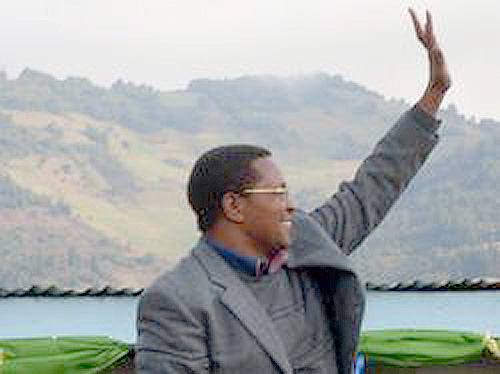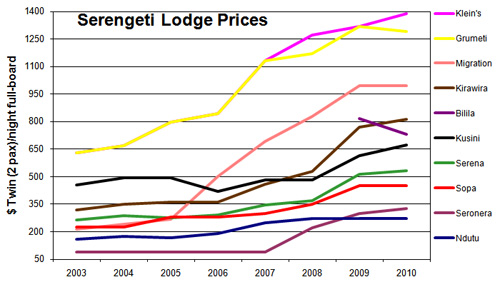
During an end of July live television speech to the country President Jakaya Kikwete said that “under no circumstances” will the government be deterred from building the road.
Kikwete doesn’t shy from the limelight, but most keen observers seriously doubted he would enter this fray. Whether the road cuts 40-50k through the neck of the Serengeti as planned, or is rerouted on a more lengthy route as we all would prefer, there are going to be very angry people, locally and foreign. Ethics, conservation and the Serengeti aside (be damned!), this is no good place for a politician.
So what’s his motivation?
I think I know, and I think he has a point (that he hasn’t made), and that point isn’t strong enough for him to really push this calamity through…
It’s already widely known that Kikwete is invested in the newest of the Serengeti lodges, the Kempinski Bilila.
If it weren’t for his intervention in the first place, this lodge would never have been built. It had initially failed to get the necessary permits from Tanzania conservation and wildlife authorities. Kikwete intervened.
Counting Bilila, there are ten principal lodges serving the Serengeti.
Only one other property, Grumeti, joined Kikwete’s Bilila in the realistic drop in prices from 2009 to 2010. All the other 9 defied market indicators arising from the world recession.
Is Kikwete’s support for the Serengeti highway linked to a belief that the property companies monopolizing the Serengeti are out of touch with markets and need to be forced into greater competition less Tanzania tourism suffer?
Boy, is that giving the fellow the benefit of the doubt! But it’s true. All the other 9 properties have been around for many decades; several of them are approaching the half century mark.
And they all market as if we were in the 14th century. When the good times roll, they raise prices as we would expect. But when a world recession hits, they also raise prices or don’t reduce them. This half-baked theory is “be damned cash flow”, just maintain some modicum of profit.
Before reading on, take a look at the price comparison of the Serengeti Lodges shown just below, then drop down to continue reading.

For retail prices add 20-30%.
Raising prices in a declining market reduces cash flow but profits can be somewhat maintain by cutting off lots of operations.
Like jobs.
As much as a third to a half of Tanzania’s tourism employees in 2006 is currently without work.
Tanzania doesn’t have an unemployment security system. There are no legal inhibitions to just telling someone not to come to work today… or anymore. AND those poor folks collect no compensation from the state once “made redundant.” Tanzania has no safety net for the newly unemployed.
That’s the ouch of the policy, but the fact is that it’s a terribly poor business strategy, anyway. It’s a short-term fix and a long-term disaster.
All the training, operational achievements, marketing strategies suddenly hit a brick wall. And to regain them when things get better isn’t just a matter of rehiring those who were fired. That rarely happens.
Serena Hotels built and integrated a modern and very expensive worldwide reservations system in 2007. It took thousands of hours to implement. They adopted an imaginative “Active Senior” program around the same time with some target marketing.
EWT just used Serena Hotels in Kigali and Kampala. It was a nightmare. I personally was at the check-in desk in Kigali untangling a terrible mess. And they seemed to have dropped their “Active Senior” program, just at the time such a program would reap huge benefits: (If any market niche is immune to the world recession, it’s seniors.)
The much better strategy is to follow capitalist principals of supply and demand. Don’t loose your investment in people’s training or marketing strategies that remain viable, and get enough cash flow to see them through the hard times.
Lower prices.
Unfortunately, unlike pricing, we can’t get occupancy rates as they are closely guarded secrets. But there is much anecdotal evidence to suggest that while Bilila is probably the most luxurious lodge in the Serengeti, when it opened in 2008/2009, it drastically lowered its initial asking prices.
And then Bilila dropped prices from 2009 to 2010, to keep its occupancy constant. Kempinski won’t say, but the best anecdotal evidence we’ve collected suggests Bilila has achieved this strategy.
If true, Bilila is reacting to real market forces and maintaining a constant cash flow by doing nothing else than lowering prices. Whereas all the others are laying off staff, closing portions of their properties and extending off-season closures.
Bilila is new, well run, and managed to the current market. There hasn’t been any new lodge in the Serengeti for more than a decade since the out-of-the-way and hodge-podge configured Mbagaleti was built. Before that it was another ten years earlier when Elewana (luxury branch of Sopa Lodges) purchased and rebuilt Migration Camp.
Frankly, that was just fine by me and many, many others. The exclusiveness of the Serengeti is one of its principal draws.
But Kikwete has a point, even if he hasn’t expressed it. The old dogs controlling the existing lodges in the Serengeti: Serena, Sopa, &Beyond and TAHI, are rutted in savoring their monopolies. As with inflexible pricing, Kikwete may see the whole cartel is inflexible to any new notion, good or bad.
Alright, so I’ve made a point, and perhaps Kikwete has, too. But is it germane to this argument about the Serengeti road?
No.
I returned from Uganda, today, and one of the most glaringly obvious difficulties it has in rebuilding its national park system is that major thoroughfares cut right through their wildernesses.
Queen Elizabeth National Park is essentially bisected by a main road, and there are burgeoning little towns at every stop conceded not to be an actual national park proper. The stress on the area’s wildlife is huge.
The tarmac roads that crisscross the great South African reserve, Kruger, absolutely stunt its wilderness growth. Kruger has one of the lowest ratios of migrating herbivores to the rest of its animal population of any park in Africa.
Herbivores constitute the base of the mammalian food chain. It eventually feeds not just the lions but the gerbils and acacia.
Mr. President Kikwete, if I’ve struck a chord with you, let’s work this out another way. I’d be all for disinvesting the monopolies that currently control the Serengeti: Legislate the right for only a single property company in each unique reserve, for example.
But don’t kill the Serengeti. That’s the worst strategy of all.
To: President JK: I am part of your esteemed Antiquities partnership. In 2008 I brought to your attention the footprints — some 400 at this time — at Engare Sero at Lake Natron. In April I was summoned to the Office of the Minister of Natural Resources in Dar and was proud to have entered into a Memorandum of Understanding between the Engare Sero Project and Antiquities. I am the Director of the Engare Sero Project (refer to Donatius Kamamba) AND NOW TO LEARN OF YOUR SUPPORT OF THE ROAD THROUGH THE NORTHERN SERENGETI. I’VE BEEN SUPPORTING YOUR COUNTRY SINCE 1981 WHEN I BEGAN BRINGING CLIENTS THERE. WHAT’S GOTTEN OVER YOU?
NO NEED TO CHANGE!!!
Africa Answerman,
I completely fail to see the connection between the highway and ‘the monopolies of companies’ in the Serengeti. First of all we speak about a monopoly if there is only one player involved. Speaking about a cartel would maybe be more appropriate, as there are several companies that have lodges in the park.
Back to your point of competition. It would be foolish to think that the road will change anything in Tanzania’s tourism share, as the road will be mainly used by (heavy) traffic going towards Lake Victoria. I agree that some tourist might drive into the park, but most will fly in and out. So what will the road change about the competition position. Nothing.
On the contrary, it will most likely kill the goose laying the golden eggs (the migration).
Thanks, Johan, but if the migration is killed, so will be a huge portion of the Tanzanian market.
@Jim,
I am 1000% against the highway. In my comment I spoke towards the writer of the article who saw the reason for the president to go ahead with the construction. I was merely trying to say that the reason mentioned is not a viable one.
This road should not go through. We love this area the way it is leave the wildlife for other generations to enjoy. You are wrong in trying to build this highway.